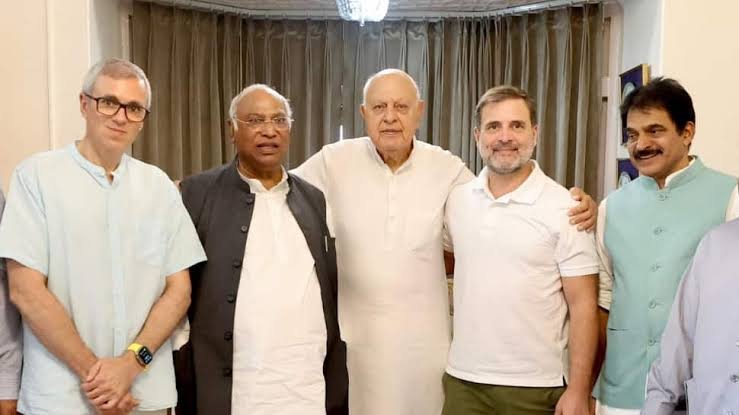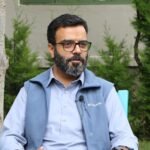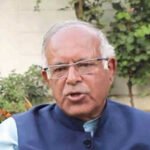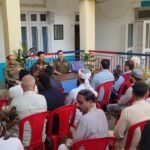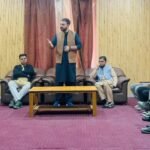By Asif Iqbal Naik
Srinagar, October 23, 2025
In a major political development ahead of the much-anticipated Rajya Sabha elections in Jammu and Kashmir, the Jammu & Kashmir Pradesh Congress Committee (JKPCC) has declared its decision to support the National Conference (NC) candidates, despite deep-rooted dissatisfaction over the conduct of their alliance. The announcement, made by JKPCC President Tariq Hameed Karra, reflects both resentment and resolve — a reluctant but principled choice to stand by the NC in the larger interest of preserving Jammu and Kashmir’s secular identity and defeating the Bharatiya Janata Party (BJP) in the upcoming contest for four Upper House seats.
Karra’s communication to NC President Dr Farooq Abdullah is candid in tone. He stated that the Congress’s one-year experience in the alliance had been “far from pleasant,” marked by “humiliations and apathy.” The Congress leadership, he said, felt sidelined as decisions were dictated by the NC without genuine consultation or regard for partnership spirit. However, Karra emphasised that the larger goal of safeguarding the secular ethos in J&K and providing strong representation in the upper house of Parliament had compelled the Congress to place its internal disagreements aside — at least for now.
“Our one-year experience in this electoral partnership has been marked by dissatisfaction,” Karra said. “Yet we now choose to be on your side primarily and necessarily to stand united against what we call the BJP agenda of atrocities and subjugation.” According to his communication to Dr Abdullah, the Congress Central leadership has been informed and fully endorsed the decision. Karra affirmed the decision conveys both a message of solidarity and a demand for reciprocity: “We feel happy as a party of ethos to keep all differences on the back burner to uphold secular values and collective political responsibility,” he said, signalling both loyalty to the alliance and a subtle reminder that the NC must reciprocate in future.
⸻
Elections after a Long Vacancy
The Rajya Sabha elections, scheduled for October 24, 2025, mark a significant institutional moment for Jammu and Kashmir. The Union Territory has remained unrepresented in the Upper House since February 2021, when the terms of its four members expired during the absence of a functioning legislative assembly. The reconstitution of the J&K Assembly following the 2024 elections paved the way for restoring the region’s representation in Parliament.
The Election Commission of India has announced polling for all four seats, with members of the J&K Legislative Assembly serving as the electorate. The elections are not merely procedural — they carry deep political and symbolic value, signalling the region’s gradual return to legislative normalcy after years of administrative suspension and reorganisation.
⸻
The Numbers Game
The contest for the four Rajya Sabha seats is defined by the composition of the newly elected J&K Assembly and the complex arithmetic of alliance politics. The NC-led coalition, which includes the Congress and independents aligned with it, currently enjoys a comfortable majority of around 54 MLAs. The BJP and its allies together hold close to 28 members. Given this distribution, the NC-Congress combine is in a commanding position to secure at least three of the four seats, while the BJP is banking on arithmetic manoeuvres and possible cross-voting to capture one.
Elections to the Rajya Sabha are conducted under the system of proportional representation through a single transferable vote. Each MLA’s vote is weighted, and the winning threshold depends on the total number of valid votes cast. Political observers note that the NC-Congress bloc’s numerical advantage almost guarantees victory on three seats, while the fourth will be closely fought. With the Congress’s formal declaration of support, the alliance is expected to consolidate its position further, though the possibility of strategic abstentions or cross-voting remains a lingering concern in both camps.
The BJP has sought to turn the election into a prestige battle, aiming to secure at least one seat to underline its political presence in the Union Territory. For the NC-Congress alliance, a clean sweep would not only reaffirm numerical supremacy but also send a national signal of regional unity against the BJP’s expanding influence.
⸻
NC Fields Four Candidates
In a move that surprised many within the alliance, the National Conference has fielded candidates for all four Rajya Sabha seats, effectively sidelining the Congress’s earlier expectations of contesting one seat. The NC’s nominees are Choudhary Muhammad Ramzan, Sajjad Ahmed Kichloo, Shammi Oberoi, and Imran Nabi Dar.
The decision to field four candidates came after the Congress declined to contest a seat it deemed “unsafe” in the current Assembly arithmetic. The NC leadership, determined to avoid leaving any seat uncontested, opted to fill all four nominations on its own slate. According to party insiders, the NC’s move was a calculated demonstration of strength, signalling its dominance within the alliance and its readiness to contest each seat on merit.
The BJP, meanwhile, has put forward three candidates — Sat Pal Sharma, Rakesh Mahajan, and Dr Ali Mohammad Mir — aiming to leverage the support of sympathetic independents and possible alliance gaps to win at least one. The multi-cornered contest is therefore expected to test both party discipline and alliance cohesion across the political spectrum.
⸻
The PDP’s Conditional Stand
Adding another layer to the unfolding political picture, the People’s Democratic Party (PDP) has chosen to keep its cards close to its chest. Party president Mehbooba Mufti has linked any possible support to the NC candidates with the fulfilment of key legislative assurances, particularly the passage of the Anti-Eviction Bill, which aims to protect local residents from displacement and property disputes. The PDP’s stance reflects both ideological caution and tactical negotiation: while sharing the NC’s opposition to the BJP, the party is reluctant to offer unconditional backing without policy commitments in return.
Political analysts interpret the PDP’s approach as a bid to retain independent relevance within the opposition camp. With limited numerical strength, the party’s support might not decisively alter the electoral outcome, but its positioning could shape post-poll equations, legislative alignments, and public perception of unity among J&K’s regional parties.
⸻
Political and Institutional Significance
Beyond the calculations of seats and alliances, these Rajya Sabha elections carry broader political meaning. They are the first since Jammu and Kashmir’s reorganisation and the first major parliamentary-level test of its restored democratic institutions. A successful and peaceful election will symbolise the return of representative normalcy, ensuring that J&K’s voice is once again heard in the Upper House of Parliament after a prolonged absence of nearly four years.
For the Congress, this moment is both an opportunity and a test. By choosing alliance discipline over resentment, the JKPCC has signalled its commitment to collective politics, but it has also placed the responsibility on the NC to restore mutual respect within the partnership. For the NC, the challenge now lies in balancing assertion with accommodation — proving that its dominance does not come at the cost of its allies’ dignity.
As polling day approaches, political temperatures continue to rise across the Union Territory. Whether the NC-Congress alliance translates its numerical majority into a clean sweep or whether the BJP manages to spring a surprise will be known soon after voting concludes on October 24. Either way, the results will shape not just the composition of the Rajya Sabha but also the future of alliance politics and secular unity in Jammu and Kashmir.

